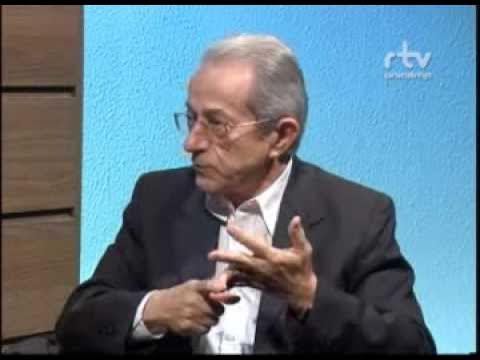Jesuítas no Brasil: A educação tradicional.
Summary
TLDRIn this video, Professor Justino delves into the historical influence of Jesuits on education in Brazil. He explores how the Jesuits, with their establishment in 1534, dominated education in Brazil for nearly 200 years. The core of their educational philosophy, encapsulated in the 'Ratio Studiorum' (1599), formed the foundation for their worldwide educational system. Their methods focused on organization, specialization, and a strict hierarchy, leaving a lasting legacy on Brazilian education. Despite their expulsion in 1759, their impact on the development of Brazilian schools, universities, and educational practices continues today.
Takeaways
- 😀 The Jesuits, a religious order founded in 1534, played a crucial role in spreading Catholicism and establishing educational systems during the Counter-Reformation.
- 😀 Jesuits had a monopoly on education in Brazil from 1549 to 1759, meaning they were the only ones allowed to operate educational institutions in the country.
- 😀 The 'ratio studiorum,' created in 1599, was a set of global educational guidelines that Jesuit schools worldwide followed, organizing both curriculum and teaching methods.
- 😀 The Jesuits viewed education as a way to promote Catholic teachings, aiming to shape students according to universal and divine principles rather than focusing on practical or secular education.
- 😀 The Jesuit educational philosophy emphasized the essentialist view of human nature, believing that all humans have an immutable, universal essence created in the image of God.
- 😀 Jesuits preferred educating children, viewing them as blank slates who could be shaped to embrace Christian values, especially among indigenous populations in Brazil.
- 😀 Despite the expulsion of Jesuits from Brazil in 1759, their educational legacy persisted as many teachers who remained had been trained by the Jesuits.
- 😀 Jesuit schools introduced innovations like specialized spaces for education (colleges) and the organization of studies from simple to complex, forming the foundation of modern educational structures.
- 😀 The 'ratio studiorum' promoted a hierarchical classroom structure where the teacher was the central authority, with students in passive roles, absorbing knowledge through lectures and rhetorical exercises.
- 😀 Jesuits implemented strict supervision within their schools, creating roles like 'prefects of studies' who monitored both teachers and students to ensure educational standards were met.
- 😀 The Jesuit educational system, though criticized for its rigid discipline and reliance on corporal punishment, was an early example of organizing education in a systematic, global manner.
Q & A
What was the primary objective of the Jesuits when they created their educational system?
-The primary objective of the Jesuits was to expand the Catholic faith during the Counter-Reformation, and they created a global educational system to support this mission.
How long did the Jesuits control education in Brazil?
-The Jesuits controlled education in Brazil from 1549 until 1759, almost 200 years, as they held a monopoly on educational institutions during this period.
What was the Ratio Studiorum, and why was it significant?
-The Ratio Studiorum was a set of educational rules and guidelines established by the Jesuits in 1599. It was significant because it standardized Jesuit education worldwide, outlining how to organize schools, classrooms, and curricula.
What kind of educational approach did the Jesuits take?
-The Jesuits took an essentialist approach to education, believing that there were universal and immutable truths within the human being, with the ultimate aim being to align individuals with divine principles.
Why did the Jesuits prefer to educate children, especially in native populations?
-The Jesuits saw children as a 'blank slate,' believing that by educating them, they could instill a new culture and faith. This was particularly relevant when they sought to catechize indigenous children in Brazil.
What were the main innovations introduced by the Jesuits in their educational system?
-The Jesuits introduced innovations such as specialized educational spaces (colleges), the categorization of students by their level of knowledge (graded education), and a more professional approach to teaching with specialized instructors.
What role did the 'Prefect of Studies' play in Jesuit education?
-The Prefect of Studies was responsible for overseeing both teachers and students to ensure that the curriculum was properly followed, maintaining discipline and academic standards within Jesuit schools.
What was the Jesuits' view on discipline and corporal punishment?
-The Jesuits believed in discipline through corporal punishment, viewing it as a form of love and correction. However, they believed that the failure to discipline was a flaw in the teacher, not the student.
How did the Jesuits’ educational methods influence Brazilian society after their expulsion?
-Even after the Jesuits were expelled from Brazil in 1759, their influence persisted because many teachers who remained in Brazil had been trained by them. Thus, their educational philosophy continued to shape Brazilian education for years.
What was the main goal of the Jesuit education system, according to the Ratio Studiorum?
-The main goal of the Jesuit education system, according to the Ratio Studiorum, was not to prepare students for practical life, but rather to mold them to live the best possible life in accordance with divine principles and to ensure their eternal salvation.
Outlines

This section is available to paid users only. Please upgrade to access this part.
Upgrade NowMindmap

This section is available to paid users only. Please upgrade to access this part.
Upgrade NowKeywords

This section is available to paid users only. Please upgrade to access this part.
Upgrade NowHighlights

This section is available to paid users only. Please upgrade to access this part.
Upgrade NowTranscripts

This section is available to paid users only. Please upgrade to access this part.
Upgrade NowBrowse More Related Video

Diálogo Sem Fronteira - Sociedade, História e Educação no Brasil - Dermeval Saviani

Jesuítas no Brasil - Brasil Escola

OS JESUÍTAS NO BRASIL, AS MISSÕES E A RELAÇÃO COM PORTUGAL

videoaula 1 da disciplina “Fundamentos da Educação Especial e Inclusiva”

O que eram Sesmarias?

Fundamentos Históricos, Filosóficos e Sociológicos da Educação - Uma introdução aos fundamentos
5.0 / 5 (0 votes)